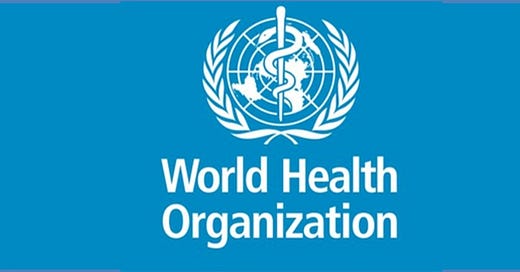Today – April 29th – marks the beginning of the last big push by the World Health Organization (WHO) technocrats and international diplomats to finalize the Pandemic Treaty that is expected to be signed at the next WHO gathering in less than a month, on May 27th. This international treaty will commit the signatories to follow the WHO directives at a time of a global pandemic.
As detailed in my Friday article, Canadians need to be aware of the WHO Pandemic Treaty, the alarm being sounded by critics of this treaty is as follows: the WHO will be empowered to call “a pandemic” at any time the organization’s leadership identifies an actual or perceived global threat and, as the draft regulations currently read, signatories will be required to follow WHO’s recommendations. In other words, it is compulsory for a treaty country to follow the WHO’s recommendations.
Should the Pandemic Treaty be signed, the WHO’s authority will be all encompassing. During a declared pandemic, the WHO will be empowered to dictate the production and allocation of vaccines, the implementation of health and safety mandates, the international sharing of health data, and the establishment of censorship measures regarding health and vaccine information.
Given how the WHO operated during the COVID-19 crisis, this unchecked authority over treaty countries’ health care systems should give enough reason for pause. However, there is even greater concern when one realizes that the WHO can determine the criteria for calling a future global crisis in which the Pandemic Treaty could then be enacted.
Consider that diplomats and officials are now discussing how to expand the definition of a “pandemic” to include anything that might impact an individual’s health. Canadian officials are leading the pack to include climate change a health criterion. So, should this come to pass, the WHO could declare a global pandemic because of climate concerns. It would be in a position to dictate recommendations on climate action and treaty countries would be committed to follow.
One might dismiss this scenario as conspiratorial. But should we? Canadians have just been witness to how their government operated when declaring emergency powers, freezing bank accounts, jailing citizens without charges, removing citizens’ freedom of assembly and movement, and censoring speech.
The WHO Pandemic Treaty is akin to Canada’s Emergencies Act on steroids.
If you are concerned about this serious issue (and you should be), contact your MP and share your thoughts. It is important to speak out.
You can stay informed on the progress of the treaty negotiations by following By George Journal. I will be printing updates here.
This is the second column of three in the By George Redux series, introducing the conflicts between Canadians’ national interests and global agendas as defined by the World Economic Forum (WEF), United Nations (UN), and the World Health Organization (WHO).
In the months ahead, By George Journal will complete a number of deep dives into the activities of the WHO, WEF and UN to address two important questions.
What impact will the full scope of global initiatives have on the sovereign nation of Canada and its citizens?
What will it mean for Canadians when the federal government is signatory and adhering to the directives, policies and treaties of the WEF, UN and WHO?
With respect to the WHO, there will be focused articles on the politics of the organization, the backstory of the WHO mismanagement through the COVID-19 pandemic period, and the coordinated plans with the WEF and UN for health data and the global digital ID program.
Today, there are a few back articles on the WHO to review….
(The “Redux series” provides paid subscribers access to an archive of issue-related articles and research.)





